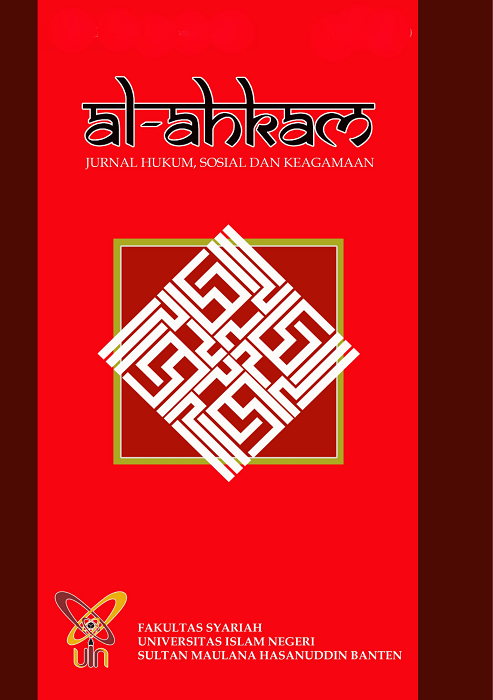Socially Causal Deterministic Analysis that Causes Criminal Liability in Era 4.0
DOI:
https://doi.org/10.37035/ajh.v18i2.5527Keywords:
Crime and punishment, Era 4.0, Crime, Justice, Determinicstic CausalAbstract
Crime and punishment are 1) a behavior, 2) a type of social phenomenon in the interactions that are built between humans, 3) natural and social phenomena, 4) including interactions between people in social life, 5) are considered as deterministic mechanical processes based on the law of causality. So that nowadays the study of crime and punishment needs to be developed in order to realize national development. This research method is a normative research where causal deterministic aims at sentencing and is not only based on the concept of retributive justice, but also on the principle of benefit generated in the sense that it aims to prevent the recurrence of similar crimes and thereby create order and national security. The results of the study show that crime and punishment against socially causal deterministic challenges that lead to criminal liability is a necessity as Satjipto Rahardjo revealed that law always evolves following human development and follows the needs and values that live in humans to realize social justice for all citizens. Indonesia.
Downloads
References
Arniyati, A. (2014). Dampak hukuman terhadap kepatuhan santri baru putra di Pondok Pesantren Kramat Pasuruan Etheses of Maulana Malik Ibrahim State Islamic University. Fakultas Psikologi Universitas Islam Negeri (Uin) Malang. http://etheses.uin-malang.ac.id/1648/
Bisri, B. (2017). Hukum-Hukum Determinisme Dalam Filsafat Sejarah Ibnu Khaldun (dialektika Antara Sains Dan Teologi). Jurnal Yaqzhan: Analisis Filsafat, Agama Dan Kemanusiaan, 3(1), Article 1. https://doi.org/10.24235/jy.v3i1.2036
Bojangan, W. A. (2017). Perspektif Dalam Membangun Sistem Hukum Yang Progresif Sebagai Salah Satu Ilmu Pengetahuan Hukum. Jurnal Hukum Unsrat, 23(8), Article 8.
https://ejournal.unsrat.ac.id/index.php/jurnalhukumunsrat/article/view/15071
Fajrin, Y. A., Triwijaya, A. F., & Ma’ruf, M. A. (2020). Double Track System bagi Pelaku Tindak Pidana Berlatar Belakang Homoseksualitas (Gagasan dalam Pembaruan Hukum Pidana). Negara Hukum: Membangun Hukum untuk Keadilan dan Kesejahteraan, 11(2), 167–190.
Imam. (2014, Rabu, Agustus). Sang Pemimpi: Sejarah dan Perkembangan Kejahatan. Sang Pemimpi.
http://imamsasmita.blogspot.com/2014/08/sejarah-dan-perkembangan-kejahatan.html
Iqbal, A. (2019). Konsep Kehendak Bebas Manusia Dalam Filsafat Muhammad Iqbal [Universitas Gadjah Mada].
http://etd.repository.ugm.ac.id/penelitian/detail/169139
Kabir, S. F. (2019). Kejahatan Dan Hukuman: Tantangan Filosofis Determinisme-Kausal Terhadap Pertanggungjawaban Pidana. Jurnal Hukum & Pembangunan, 49(2), 279–298.
https://doi.org/10.21143/jhp.vol49.no2.2003
Khoir, T. (2014). Determinasi Eksistensial Pemikiran Hukum Islam Abdullahi Ahmed An-Na`im. Islamica: Jurnal Studi Keislaman, 9(1), 110–135. https://doi.org/10.15642/islamica.2014.9.1.110-135
Kusnandar, M. I., & Humulhaer, S. (2021). Penetapan Anggaran (APBD) Berbasis Perencanaan Berdasarkan Perundang-Undangan Dalam Perspektif Yuridis. Al Ahkam, 17(2), 31–35.
https://doi.org/10.37035/ajh.v17i2.5027
Lewokeda, M. D. (2018). Pertanggungjawaban Pidana Tindak Pidana Terkait Pemberian Delegasi Kewenangan. Mimbar Keadilan, 14(28), Article 28. https://doi.org/10.30996/mk.v0i0.1779
Rahardjo, S. (2006). Ilmu Hukum. PT Citra Aditya Bakti.
Reckless, W. C. (1971). Crime Prevention Through Environmental Design. Sage Publications.
https://journals.sagepub.com/doi/abs/10.1177/000276427101400409
Situmeang, S. M. T. (2020). Diktat Mata Kuliah Krimonoogi. Universitas Komputer Indonesia. http://elibrary.unikom.ac.id
Sofian, khmad. (2020). Ajaran Kausalitas Hukum Pidana. Prenada Media.
Supriyono, S. (2017). Hukum Pidana Indonesia Ditinjau Dari Teori Hukum Positivisme. Fenomena, 15(2), 1696–1704.
Vold, the late G. B., Bernard, T. J., & Snipes, J. B. (2001). Theoretical Criminology (5th edition). Oxford University Press.
Downloads
Published
Versions
- 2023-01-24 (2)
- 2022-12-30 (1)
How to Cite
Issue
Section
License
Copyright (c) 2022 Muhamad Ghofir Makturidi, Ayi Yunus Rusyana

This work is licensed under a Creative Commons Attribution-ShareAlike 4.0 International License.










